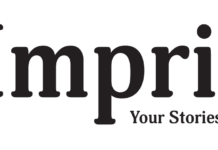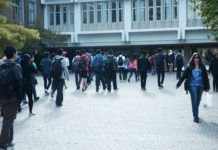Upcycling, the process of taking old or waste products and repurposing them again, is favoured for how it helps reduce waste sent to landfills and exercises creativity. It has been touted around blogs and craft fairs as a fun way to contribute to the green movement and make something new.</p>
For Tarini Chandak and Gina Han, graduate students of the University of Waterloo’s School of Accounting and Finance, upcycling is also a good business model. The two founded FourOneSixFourSeven, a company dedicated to upcycling T-shirts in order to repurpose them into quality accessories such as laptop sleeves. Their sustainable mandate comes from a place near and dear to both of their hearts.
“For us it was the idea of wanting to be able to bring something that was old and make it new, help make the fashion production process better but also make something that is quality, something that we want to take around when we’re downtown and going to work or going to class. Something that we can keep for a long time because it’s made well,” said Chandak.
Their idea won them the $5,000 Creative Business Grant courtesy of UW alumnus-owned Ten Thousand Coffees and online craft marketplace Etsy. According to the Ten Thousand Coffees blog, the business networking startup partnered with Etsy “to spark conversations between creative business owners and aspiring entrepreneurs.”
FourOneSixFourSeven is also targeting environmental concerns, hoping to bridge the gap between vintage fashion and sustainable lifestyles.
“A lot of the [DIY] projects that you see are kind of one-off projects that can’t really be repeated, and the problem with that is that a lot of the times it’s cute but would I use it every day?” said Han. “It’s a bigger outreach when you turn it into a business … We want to make a big impact on the environment by centralized production of this one product.”
Reducing textile and garment waste is a major goal for Chandak and Han. Five per cent of all landfill waste is textiles, and 93 per cent can be successfully reclaimed. The two aim to marry fashion with sustainability and social enterprise.
Their company officially launched two days after Earth Day 2015 and in honour of that their goal is to upcycle at least 100 shirts and reach at least 1,000 customers by next year — no small feat for their handmade-focused business.
“We just started out so it’s a lot of hand-making, which is a lot of fun,” said Han. “We actually went to Kensington Market [recently] to pick out a couple of shirts that we liked and are something that if somebody turned into a laptop case we would use ourselves.”
Sourcing their shirts from thrift and textile stores in places such as Kensington Market and Toronto’s Queen Street area, Chandak and Han turn regular cotton T-shirts into long-lasting laptop sleeves. The current product in their Etsy shop is made out of an old UW branded T-shirt and costs $30.
“I think one of our challenges down the road is going to be how to scale that into a bigger model,” says Chandak. “A challenge a lot of social enterprises face is how to scale and how to turn something we do by hand into something that can be produced more efficiently but still maintain the quality and the personal touch that you get from a hands-on project.”
Chandak and Han plan to explore more product options before scaling the process up. FourOneSixFourSeven pencil cases, makeup bags, and phone cases are in the works, plus plans for custom tags featuring their branding.































